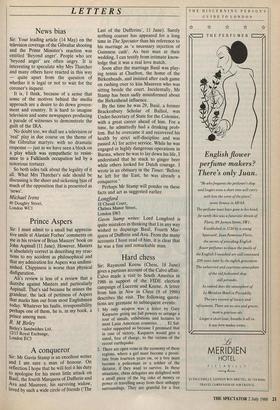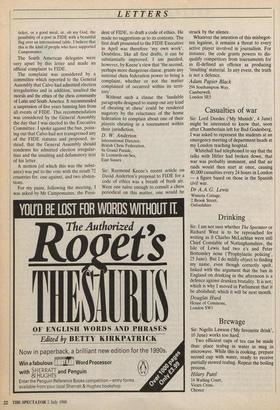Hard chess
Sir: Raymond Keene (Chess, 18 June) gives a partisan account of the Calvo affair. Calvo made a visit to South America in 1986 in support of the FIDE election campaign of Lucerne and Keene. A letter from him in New in Chess (8 of 1986) describes the visit. The following quota- tions are germane to subsequent events:
1. My only weapon was a letter by Gary Kasparov giving me full powers to arrange a tour of simuls, exhibitions and lectures to most Latin American countries. . . . El Sal- vador supported us because I promised that in case of victory, Kasparov would give a simul, free of charge, to the victims of the recent earthquake.
2. There are open veins in the economy of these regions, where a girl must become a prosti- tute from fourteen years on, or a boy must become a policeman or a soldier of the dictator, if they want to survive. In these situations, chess delegates are delighted with a small piece of the big cake of money or power or travelling away from their unhappy surroundings. They are grateful for a free
LETTERS
ticket, or a good meal, or, oh my God, the possibility of a post in FIDE with a beautiful flag over an international table. I believe that this is the kind of people who have supported Campomanes.
The South American delegates were very upset by this letter and made an official complaint to FIDE.
The complaint was considered by a committee which reported to the General Assembly that Calvo had admitted election irregularities and in addition, insulted the morals and the ethics of the chess community of Latin and South America. It recommended a suspension of five years banning him from all events of FIDE. This recommendation was considered by the General Assembly the day that I was elected to the Executive Committee. I spoke against the ban, point- ing out that Calvo had not transgressed any of the FIDE statutes and proposed, in- stead, that the General Assembly should condemn his admitted election irregular- ities and the insulting and defamatory text of his letter.
A motion (of which this was the subst- ance) was put to the vote with the result 72 countries for, one against, and two absten- tions.
For my pains, following the meeting, I was asked by Mr Campomanes, the Presi- dent of FIDE, to draft a code of ethics. He made no suggestions as to its contents. The first draft presented to the FIDE Executive in April was therefore 'my own work'. Doubtless, like all first drafts, it can be substantially improved. I am puzzled, however, by Keene's view that 'the second, perhaps more dangerous clause, grants any national chess federation power to bring a complaint, whether or not the matter complained of occurred within its terri- tory'.
Without such a clause the 'laudable paragraphs designed to stamp out any kind of cheating at chess' could be rendered nugatory by the reluctance of the home federation to complain about one of their players cheating in a tournament within their jurisdiction.
D. W. Anderton
International Director, British Chess Federation, 9a Grand Parade, St Leonards-on-Sea, East Sussex















































 Previous page
Previous page